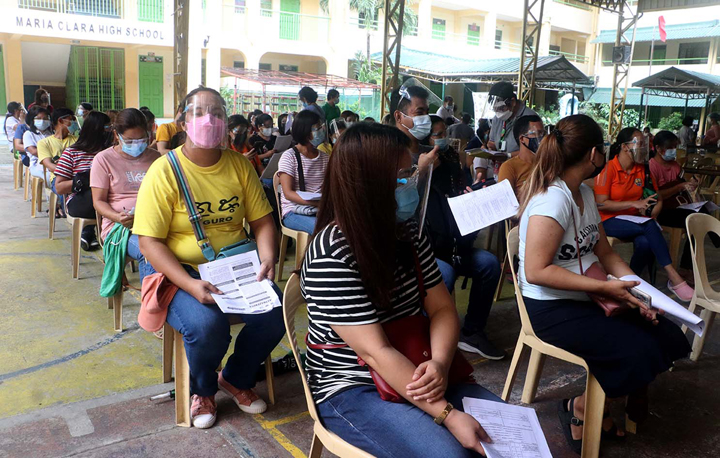
THE national government’s budget balance swung to a deficit in June, pushing the shortfall for the first half of the year to P716.1 billion, according to the Bureau of the Treasury.
The cumulative budget deficit from January to June this year was wider than the P560.4 billion recorded in the same period last year.
The wider deficit resulted from government expenditures exceeding its revenues.
However, the actual budget gap for the six-month period was down by 29.66 percent compared to the government’s program of P1.018 trillion.
Revenues in the first semester this year stood at P1.49 trillion, posting a 2.55-percent uptick from last year’s P1.45 trillion. The government also breached its revised forecast of P1.42 trillion.
Of the total, 90 percent was raised through taxes while the rest came from non-tax sources.
On the other hand, state expenditures in the same period rose by 9.57 percent to reach P2.21 trillion from P2.01 trillion a year ago.
Although government spending improved during the first half of this year, it still fell short of the P2.44-trillion revised program by 9.56 percent.
“This is mainly due to the timing of subsidy releases awaiting requests from the concerned GOCCs [government-owned and -controlled corporations], the pending enactment of the GUIDE [Government Financial Institutions Unified Initiatives to Distressed Enterprises for Economic Recovery Act] bill, outstanding checks as of end-June which are yet to be encashed by contractors or suppliers of line agencies, as well as interest savings,” the BTr said in a statement.
For June alone, the national government posted a P149.9-billion budget deficit, reversing the P1.8-billion budget surplus in the same month in 2020.
This resulted from the decline in revenue collection as there was no extension on the payment of income taxes this year, unlike last year when it was extended to June.
Revenues dropped by 30.03 percent year-on-year to P245.6 billion in June from last year’s P351 billion.
Expenditures
Meanwhile, expenditures during the month climbed to P395.4 billion, a 13.24-percent uptick from P349.2 billion in 2020.
The Cabinet-level Development Budget Coordination Committee (DBCC) raised its projection for the country’s budget deficit-to-GDP ratio this year to 9.3 percent or P1.86 trillion, from 8.9 percent or P1.78 trillion previously.
ING Bank Manila economist Nicholas Antonio T. Mapa warned that the country could face a credit downgrade as early as the first quarter of next year if the country continues with its “current fiscal deterioriation.”
Mapa noted international credit watcher Fitch Ratings said back in April that it would hold off downgrades for the entire 2021 and postpone possible rating actions to 2022.
While Fitch Ratings revised its outlook on the Philippines’s rating down to “negative” from “stable” as it cited the strong impact of the pandemic on the economy, it affirmed the country’s rating at “BBB.”
“With the YTD [year-to-date] deficit at 716 billion, approximately 8 percent of GDP, it’s getting more challenging to keep the debt-to-GDP level below 60 percent for the year. This could trigger a downgrade as early as 1Q 2022,” Mapa told the BusinessMirror in a message.
For his part, UnionBank Chief Economist Ruben Carlo Asuncion said that other credit rating agencies may follow Fitch Ratings’ move given the current fiscal balance situation of the government.
“With Fitch starting off with a preview of a downgrade, I cannot help but think that other credit rating agencies may follow suit. It may not mean an actual downgrade in the medium-term, but the fiscal challenge is really real,” Asuncion said.
As for the government missing its spending program, Mapa said this suggests a “softer outturn” for second-quarter GDP as government spending remains “tepid” amid ongoing recession and pandemic.
“The economy has been counting on government spending to fill the void left by the private sector and with this development, we understand that authorities have struggled to get out badly needed expenditure to help support the economy,” he said.
“Given underspending in the first half of the year, we are expecting 11 percent gain in GDP, largely driven by low base,” he added.
Asuncion noted that government spending has been the challenge, not just because of the crisis.
“This is one of the biggest issues that the next administration should seriously look into and make a real reforming dent if we really want to make fiscal policy work for the economy, and consequently, the people,” he said.
The DBM on Tuesday said in a separate report that it expects government spending to recover in the second half of the year.
“Disbursements will also be supported by the implementation of agency catch-up plans, particularly for those agencies which experienced implementation delays,” it said.
To avert a credit rating downgrade, Mapa said the government should really boost its spending.
“Ironically, I think we should spend more, which will bloat the deficit but will provide a boost to growth. Faster growth will in turn generate revenue momentum to offset higher spending,” he said.
But for Asuncion, the government must improve its handling of Covid’s spread and raise its vaccination rates so it could reopen the economy at least by the end of the year.
Apart from this, it is important for government to meet its fiscal spending targets and to completely and effectively roll out the 2021 national budget, he said.
“A 70 percent level of vaccination may actually be too ambitious, but a significant level of vaccinations by the end of 2021, will greatly improve economic prospects and confidence in consumers and business,” he said.
Image courtesy of Nonoy Lacza

